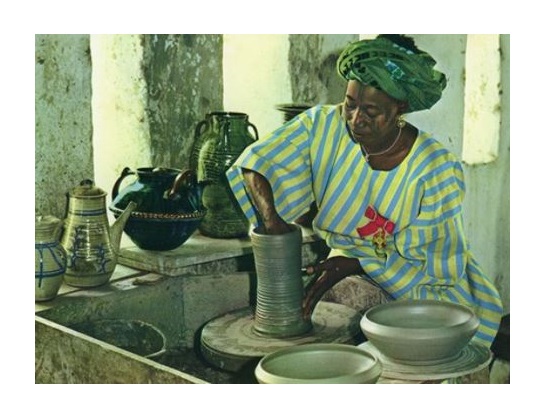Some argue that genius is genetic; pure nature, others claim that genius is achieved; sheer nurture. Whatever position you take. Nigerian Pottery defines genius from one name, Kwali; Ladi Kwali.
The name Ladi Kwali is a combination of a day and a place; an ‘unusual’ name for a woman that impacted Nigeria’s art in an ‘unusual’ manner. ‘Ladi’ is a term (a northern Nigerian derivative of ‘lahadi’- used in referring to the day of the week, Sunday), meaning ‘one born on Sunday’. Kwali on the other hand is a town of the ‘Gbagyiza’ (also referred to as the Gwari people), in the modern day Abuja, the hometown of Ladi.
Early Life and the Art

Ladi Kwali was born in 1925 to a family in a community that pottery was the source of livelihood for most of the women. Pottery at that time was crude and rudimentary, and the Gwari pottery usually produced three major shapes: the Kasko (a local baking and frying pan which doubly serves as a storage object depending on the size and shape), the Randa (a large water pot that served as a coolant when kept on sand) and the Tulu (a pot used in religious festivals and served both as a storage facility as well as a musical instrument in some cycles). These ‘rudimentary’ patterns were the building blocks for Kwali’s later ‘sophistication’.
Kwali became a force to be reckoned with in the pottery industry due to her proficiency and innovativeness in fusing the ‘rudimentary’ and the ‘modern’ techniques. For example, she was able to harness the potential of the ‘Coil and Pinch’ technique to blend with the advanced ‘glazing, wheel throwing, kiln firing and stoneware’ methods. The products of this blend were the elaborately designed bowls, beakers, dishes, pots etc. that spoke words that only the eyes could hear.
From ‘Potter Woman’ to ‘Poster-Woman’ for African Pottery
Every musical album that is worth hearing should have hit tracks- (or at least a hit track)-it is unforgiveable not to. For Nigeria (and arguably Africa), Kwali became the hit; the greatest export of African Pottery. Howbeit, with the help of Michael Cardew. Cardew was a successful English Potter, recruited by the colonialists as a pottery officer in Abuja Pottery. Because of the elegance, beauty of form, exquisite designs and decorations of Kwali’s works, she was hugely patronized by the Emir of Abuja, Alhaji Suleman Barau. It was at the Emir’s place that Cardew stumbled into Kwali (through her works) in 1950. Kwali and Cardew became an example of ‘when talent meets opportunity’. Important to highlight is, Cardew met Kwali as an already highly skilled and excellent potter. However, Cardew was instrumental in her attainment of international recognition through his connections with galleries, universities and other institutions of learning abroad.
Ladi: Lady and Legend
Kwali was (and is) a source of pride and inspiration to Nigerian women. Though in a male dominated era, she made clear that a lady could attend legendary status in her stock of trade. Some facts that buttress this include:
- Ladi Kwali was the pioneer of modern pottery in Nigeria.
- She is remembered as Nigeria’s most impressive and well-known potter.
- She was the first female potter to join the Pottery Training Centre (formerly called Abuja Pottery).
- Her presence in Abuja pottery served as a catalyst for other women to be attracted and join the pottery enterprise on a more professional level. Notably, Halima Audu, Kande Ushafa, Assibi Iddo, Lami Toto
- Though she could neither read nor write, Ahmadu Bello University, Zaria awarded her a Doctorate degree in 1977. Worthily of course, given that she gave lectures and demonstrated her craft both in and beyond Nigeria as well as serving as a part-time lecturer and demonstrator at the Ahmadu Bello University, Zaria.
- Ladi Kwali and her works travelled beyond the shores of the African continent especially to Europe and America. As a matter of fact, her works caught the attention of many in London at the Berkeley Galleria in the late 1950’s and early 1960’s.
- Every other potter was second to Ladi Kwali prior to her death. She was regarded as the best known Nigerian potter till at the time of her demise on 12th August 1984.
- Ladi Kwali moved Nigerian Ceramics and Pots from just ‘domestic utensils’ to art objects for International exhibitions.
- As of the time of writing this article, Ladi Kwali is the first and only Nigerian woman to have been featured on any Nigerian currency (the back of the twenty naira note).
Other notable things about Ladi Kwali include that:
- She received the Silver Award for Excellence at the Tenth International Exhibition of Ceramic Art, Smithsonian Institute, Washington DC.
- Ladi Kwali was a recipient of the Member of the British Empire (MBE) honor; the most excellent order of the British Empire in 1963.
- She was invested by the Nigerian Government with the Nigerian National Merit Award (NNMA), which is regarded as the highest national honour for academic achievement in Nigeria.
- In addition to that, Ladi Kwali was also conferred with the National honour of the Officer of the Order of the Niger (OON) in 1981.
Ladi Kwali: Death and Legacy
Ladi Kwali died on the 12th of August 1984 in Minna, Niger State of Nigeria. Post-humously, the following are some of her legacies with respect to Ladi Kwali.
- A major street in Abuja is called Ladi Kwali road.
- One of the largest conference facilities in Abuja is referred to as the Ladi Kwali Convention Center in the Sheraton Hotels.
- The Abuja Pottery has been renamed after Ladi Kwali.
- Her rich legacy of works are icons of modern art in Nigeria and serve as ‘study materials’ for students of art both home and abroad.
- She features as the first and only woman to on any Nigerian currency (the back of the twenty naira note.

